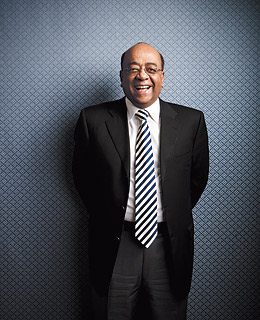
Mo Ibrahim has always been a man of vision. His doctoral thesis dealt with mobile communications—in 1974. When he started a mobile-phone company, Celtel, in 1998 to work exclusively in Africa, there were just 2 million cell phones on the continent. When he sold it seven years later, there were more than 100 million.
A British national with roots in Sudan, Ibrahim never lost faith in his native Africa. He understood the enormous potential that could be unleashed by technology. Until then, unreliable and inadequate telephone landlines had frustrated Africans' entrepreneurial abilities. While doing business in Africa, he recognized two other essential but unmet needs: good governance and accountable institutions.
To pursue his vision of a better Africa, Ibrahim, 61, set up a foundation in his name to rate countries on their quality of governance. This annual country index shames governments into bettering their ratings and provides a nuanced picture of the continent's institutions to non-Africans, who tend to see Africa's problems as insurmountable. The inaugural Mo Ibrahim Prize for Achievement in African Leadership, which rewards respect for democratic institutions, went to former President of Mozambique Joaquin Chissano last year. Judging by the upwelling of democracy on the continent, it looks as if Mo Ibrahim once again is in the vanguard of change.
Easterly, author of The White Man's Burden, is an economist at New York University